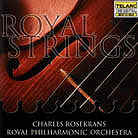|
You are reading the older HTML site
Positive Feedback ISSUE 7
Royal Strings: Arrangements for strings Royal Philharmonic Orchestra/Charles
Rosekrans MENDELSSOHN: Octet, Op.20: Allegro moderato. VAUGHAN WILLIAMS: Fantasia on Greensleeves (Cleo Gould, violin). DVORÁK: Serenade, Op.22: Moderato. ALBINONI-GIAZZOTTO: Adagio for Strings (Cleo Gould, violin). TCHAIKOVSKY: Serenade, Op.48: Waltz. PURCELL-STOKOWSKI: Dido and Aeneas: Dido's Lament (Christine Jackson, ‘cello). BRAHMS: Quintet, Op.111: Poco allegretto. SCHUBERT-ORR: Ständchen (Christine Jackson, ‘cello). BEETHOVEN-ROSEKRANS-MANOLI: Quartet, Op.131: Presto; Quartet, Op.135: Lento assai. This program reminded me of the proverbial definition of a camel as a horse designed by a committee. The disc seems intended as a Pops-type collection of string favorites, but in fact the program is light on chestnuts: just Greensleeves and "Albinoni's Adagio" – not one of the four seasons in sight. The surrounding selections, including single movements of chamber works, may be a bit much for the easy-listening contingent, while those listeners interested in them would most likely bypass the disc entirely! In our impoverished post-Ormandy/Karajan age, ravishing Philadelphia- or Berlin-style string sections aren't exactly there for the taking. Unfortunately, you won't mistake the Royal Philharmonic strings for these, or even for the Mantovani Orchestra (thank God, I hear you thinking). Their playing here never transcends routine professional competence: their well-balanced but unalluring sonority, with its rough-and-ready tonal blend, has no warmth, elegance, or sheen. Nor is Charles Rosekrans, a veteran of the American regional opera circuit, equipped to guide them further. I suspect the program was his idea – he is listed as an arranger in the Beethoven selections – and one understands his desire to record relatively substantial fare. But, after years of dealing with the exigencies of "mid-size" opera – frequently involving minimal rehearsals with a pickup orchestra – here he settles for getting the notes in basically the right places. The Mendelssohn Octet movement, opening the program, immediately gives the game away: the big melody fails to vault, while below it the pulsing afterbeats are distractingly present. Coarse attacks mar the downward flourish near the exposition's end. There is no jubilation or lift in the plodding coda. (And why on earth does Rosekrans pedantically observe the exposition repeat? It's ludicrous in this context, and the 16:23 movement overbalances the remainder of the program.) In the expanded chamber movements, the gain in tonal weight is offset by the loss of flexibility, of give-and-take. More coarse tone is allowed to pass in the Beethoven Op.131 movement, which sounds stiff, as does the Brahms. But the spacious Lento assai from Beethoven's Op.135 quartet makes an effectively subdued, ruminative finish. The simple, dignified Greensleeves, with its restrained modal expression, is best here. (The concertmistress plays both solo invocations – no flute in sight.) A few seconds' longer pause between this and the Dvorák Serenade movement, however, would not have been amiss. Given the general lack of distinction, Telarc's usual good, clear sound becomes less than an unalloyed blessing. Stephen Francis Vasta
|

